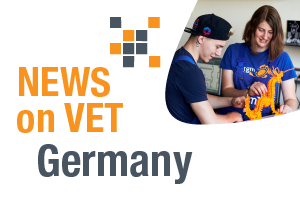The Vocational education and training (VET) report and the associated VET data report were published in May 2024. Positive developments on the VET market are set against current and future challenges for German VET.
The VET report from the education ministry and the complementary data report from the Federal Institute for Vocational Education and Training provide figures from the past reporting year on VET activities, and contextualise them against the background of sociopolitical situations at regional, national and international/global levels and over a longer period of time.
Vocational training becoming more attractive again
After a decline in the number of young people interested in VET since 2012, more young people are now opting for VET again. This includes both school-based VET programmes, which are mostly offered in the healthcare, education and social services sectors, as well as dual VET programmes (apprenticeships). The number of beginners starting school-based VET programmes rose by 2.0% and those of dual VET programmes by 1.7%. In 2023, the number of apprenticeship graduates who were taken on by their former training companies increased to reach the pre-pandemic level of 77%. Over time, this has been the highest take-on rate since 2000.
The overall long-term development shows a shift away from dual VET programmes towards school-based VET programmes, a trend towards higher school-leaving qualifications and an increased trend towards studying.
Supply and demand do not match
Matching the supply of apprenticeship places with the demand from those willing to train is still one of the biggest challenges faced by German VET. In 2023, the number of apprenticeships places offered increased by 3.4% to 562 000, which was much higher than the number of newly concluded apprenticeship contracts, which rose by 3.0% to 489 200. However, even though a high number of apprenticeship places remained unfilled, there were also about 26 400 young people who were unable to find an apprenticeship place for their desired occupation. This was 38.2% higher compared to 2019 and this trend will continue to increase in the future.
VET stakeholders: different perspectives on common challenges
The Ministry of Education is legally obliged to inform the Federal Government about the status of German VET on an annual basis; therefore the VET report has been published every year since 1977. The close cooperation between all stakeholders in the German VET system is also reflected here.
The social partners involved in VET are asked to submit statements on the current state of VET in Germany, reflecting the different perspectives on common challenges. While the employers' side emphasises company participation in dual VET, particularly during economically challenging times, the trade union side sees the decreasing diversity in companies willing to provide apprenticeships as a cause for concern. Due to the noticeable decline particularly in small and micro companies, the future training of skilled labour will be based on an increasingly smaller base of companies.
The issue of NEETs, young people who are at risk of dropping out of the education system completely, is a shared concern for all social partners. Here, among other things, even stronger educational policy action is seen as necessary in terms of careers guidance at school and across all school types, as well as the need for reliable data to identify and approach potential NEETs.
Read more
BMBF. (2024). Der Berufsbildungsbericht [The Vocational Education and Training Report report].
BIBB. (2024). Datenreport zum Berufsbildungsbericht 2024 [Data report on the Vocational Education and Training Report 2024].
BIBB. (2024). BIBB-Hauptausschuss verabschiedet Stellungnahme [BIBB Board adopts social partners' statement on the report].
Please cite this news item as:
| Please cite this news item as: ReferNet Germany, & Cedefop (2024, September 12). Germany: VET reports 2024 – how is German VET doing? National news on VET |
